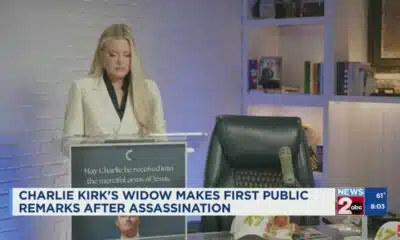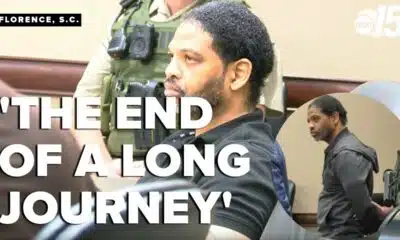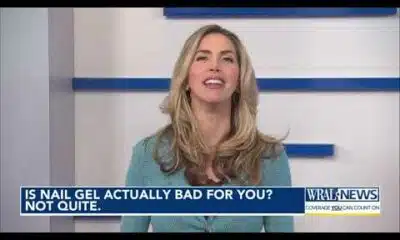News from the South - Virginia News Feed
Youngkin’s vetoes take another hit on cannabis reform in Virginia
Youngkin’s vetoes take another hit on cannabis reform in Virginia
by Markus Schmidt, Virginia Mercury
March 26, 2025
Gov. Glenn Youngkin has once again thwarted a bipartisan effort to establish a regulated and taxed adult-use cannabis retail market in Virginia, vetoing a key proposal that would have created the framework for such a system. He also rejected measures designed to modify sentences for individuals convicted of marijuana-related offenses and protect legal cannabis users from discrimination in child custody battles.
Youngkin’s vetoes dealt another blow to cannabis reform advocates, who argue that the governor’s opposition to these measures continues to favor the status quo of unregulated marijuana sales. Cannabis is legal in Virginia for personal use, but the state still lacks a retail system that would allow legal, regulated and taxed sales.
The centerpiece of the vetoed legislation was House Bill 2485, sponsored by Del. Paul Krizek, D-Fairfax, who expressed disappointment over Youngkin’s second veto of a bill that he said would have not only generated millions of dollars for substance abuse treatment and law enforcement but also provided a safe, regulated market for cannabis.
“It’s wrong to allow the criminals to keep making money in this illicit market while pushing dangerous products,” Krizek said in a phone interview Tuesday, adding that a regulated cannabis system could boost state revenue by $300 million annually.
“Virginians deserve a well-regulated and tested market that is taking into account the issues that the governor is concerned with, which is why cannabis regulation will be a key issue in the upcoming gubernatorial campaign.”
Krizek’s legislation, which is identical to Senate Bill 970, sponsored by Sen. Aaron Rouse, D-Virginia Beach, proposed a timeline for issuing licenses for marijuana cultivation, processing, distribution and retail. It also tasked the Virginia Cannabis Control Authority to oversee the new industry. Licenses could have been issued as early as September 2025, with the first retail sales expected no sooner than May 2026.
Virginia made history in 2021 as the first Southern state to legalize small-scale marijuana possession and home cultivation for adults. But while cannabis is legal for personal use, the state has never finalized a plan for commercial sales. With no legal retail market in place, an unregulated underground market has flourished, contributing to safety and health concerns.
Del. Chris Obenshain, R-Montgomery, a local prosecutor and one of the two Republicans in the House to support Krizek’s proposal, expressed his commitment to sensible cannabis regulation in Virginia. “I have been an advocate for common sense legislation to regulate the adult cannabis market in Virginia,” he said.
Obenshain acknowledged the bipartisan support the bill garnered this year but also noted that many colleagues still had genuine concerns.
“I’ll continue working in a bipartisan fashion until we find the right balance on legislation that can keep Virginians safe while also eliminating the confusing legal regime and proliferation of potentially dangerous products that currently exists,” he added.
Youngkin, who rejected a similar bipartisan measure last year, said in his veto statement that states following this path have seen “adverse effects on children’s and adolescents’ health and safety, increased gang activity and violent crime, significant deterioration in mental health, decreased road safety, and significant costs associated with retail marijuana that far exceed tax revenue.”
The governor further stated that a regulated, legal market place “does not eliminate the illegal black-market sale of cannabis, nor guarantee product safety.”
For advocates like Chelsea Higgs Wise, executive director of Marijuana Justice, Youngkin’s rejection is a major setback for public health in Virginia.
“We’re looking at at least another year before we are able to provide Virginia with a tested and regulated market, which would center Virginia’s public health for many consumers,” Wise said.
“Meanwhile, the underground market continues to expand, and federally legal, hemp-derived products flood the state, putting residents at risk. And now this governor this week has just sent a big message to Virginia consumers that our health is not a priority, that keeping our kids safe, keeping us safe, is not a priority for him.”
Justice for past offenders?
Another piece of legislation, HB 2555 by Del. Rozia Henson, D-Woodbridge, would have allowed individuals convicted of certain marijuana-related felonies before 2021 — when marijuana was legalized in Virginia — to receive automatic hearings for sentence modifications if they were still incarcerated or under supervision.
This bill would have applied to convictions for offenses like marijuana possession, manufacturing, or distribution committed before the state’s marijuana legalization laws took effect.
Youngkin vetoed the proposal, arguing that it “places an undue burden on courts, prosecutors, and victims,” and could allow sentence reductions for individuals convicted of serious crimes, such as fentanyl distribution or selling marijuana to minors. He further emphasized the importance of maintaining public safety and avoiding judicial complications in such cases.
Stephanie Shepard, director of advocacy for the Last Prisoner Project, expressed her frustration with the governor’s move.
“This veto ignores the families still suffering from prohibitionist laws repealed three years ago. Virginia ended cannabis prohibition in 2021, yet many remain incarcerated for offenses that are no longer crimes. This bill was a crucial step toward justice — one the governor has now denied.”
Wise echoed these sentiments, noting that the bill had already been modified to exclude individuals convicted of violent crimes.
“We did change the bill this year to remove people that had violent crimes associated with their sentencing,” she said. “Even with these adjustments, the governor still claims it would be too burdensome on the courts.”
Protecting parents’ rights
Finally, HB 2613, sponsored by Del. Nadarius Clark, D-Suffolk, would have ensured that parents’ legal use of cannabis — or other authorized substances—would not be used against them in custody or visitation determinations.
The bill sought to prevent investigations for child abuse or neglect solely based on lawful behavior, such as legal cannabis possession or prescribed medication use. It would have required local social services departments to update their policies to reflect these changes.
Youngkin’s veto statement echoed concerns about child safety, warning that the bill would “risk exposing children to harm.” He argued that legal marijuana use could lead to increased incidents of child endangerment, citing concerns over children ingesting cannabis-infused products.
For Wise, the bill’s veto was a missed opportunity for much-needed reform.
“This is a technical fix that should have happened in 2021,” she said. “And it’s not just about marijuana; it’s about ensuring parents aren’t penalized for using authorized substances like methadone or prescription drugs.”
Despite Youngkin’s vetoes, which continue to highlight his resistance to a fully legalized and regulated cannabis market, public support for reform remains strong.
A 2024 Roanoke College poll found that 63% of Virginians back policies that would help small cannabis businesses compete with larger pharmaceutical companies and medical dispensaries.
Even with the latest setbacks, Democratic lawmakers, a small number of Republicans, and cannabis reform advocates are pushing for a renewed effort to establish a retail cannabis market, underscoring the need for consumer protection, tax revenue generation and the reduction of illegal sales.
In a silver lining for advocates, the General Assembly passed House Joint Resolution 497, also sponsored by Krizek, establishing a joint commission to oversee what advocates believe to be a transition to an inevitable legal retail cannabis market in Virginia.
The creation of this commission, which does not require the governor’s approval, is set to begin its work this summer and operate until July 1, 2028. It provides a platform for public comment and engagement, ensuring that voices from across the state are heard as the transition moves forward.
“We’ll be able to talk to the legislators in both chambers, and we’ll continue to make edits on our current proposal, so that whatever governor comes in for next year, we will all be on the same page about what we want for Virginia,” Wise said. “And that’s our win for this session.”
And when asked if he plans to introduce the cannabis legislation for a third time next year, Krizek responded with determination: “You bet,” he said. “I think, no matter who the governor is, I feel like we’re going to make it happen. I’m going to make it happen.”
YOU MAKE OUR WORK POSSIBLE.
Virginia Mercury is part of States Newsroom, a nonprofit news network supported by grants and a coalition of donors as a 501c(3) public charity. Virginia Mercury maintains editorial independence. Contact Editor Samantha Willis for questions: info@virginiamercury.com.
The post Youngkin’s vetoes take another hit on cannabis reform in Virginia appeared first on virginiamercury.com
News from the South - Virginia News Feed
Area of interest forms in the Atlantic
SUMMARY: On September 11, 2025, Chief Meteorologist Tim Pandages reported on Hurricane Hub Live about tropical developments in the Atlantic and eastern Pacific. In the Atlantic, a low-chance area of interest near the Cabo Verde Islands may become Tropical Storm Gabrielle but requires favorable conditions. Recent tropical waves have struggled due to stable atmospheric conditions. Models show possible development east of the Leeward Islands with a likely recurving path away from Bermuda. In the eastern Pacific, Tropical Depression 13E has formed, expected to become Hurricane Mario, the season’s 8th hurricane. The Atlantic has had only one hurricane so far, Major Hurricane Aaron. Activity is expected to increase into October.
The newly formed area of interest could become Invest 92-L off the coast of Africa. Find out about that and more during tonight’s episode of Hurricane Hub LIVE! Livestream from Thursday, September 11, 2025.
Subscribe: https://www.youtube.com/user/wvectv/?sub_confirmation=1
Download the 13News Now app: https://bit.ly/13NewsNowApp
Watch 13News Now+ for free on streaming: https://www.13newsnow.com/13NewsNowPlus
Check out our website: https://www.13newsnow.com/
Like us on Facebook: https://www.facebook.com/13newsnow/
Follow us on X/Twitter: https://x.com/13newsnow
Follow us on Instagram: https://www.instagram.com/13newsnow/
News from the South - Virginia News Feed
Cat cafes, chromotherapy and pumpkin delivery: Here’s what’s new in RVA this September
SUMMARY: This September in RVA, Patch to Porch RVA delivers handpicked pumpkins from local farms, offering design, setup, and cleanup services for homes and events in Richmond, Henrico, and Chesterfield. Shore Pump introduces Beam Light Sauna, featuring infrared sauna and chromotherapy, promoting detox, skin renewal, and wellness with customizable sessions and memberships. The Fan now hosts River City’s first cat café, The Perfect Bean, combining a coffee bar with an adoptable cat lounge upstairs. Sourced locally, their drinks include seasonal, cat-themed specials. Cats come from Purring Hearts VA rescue, offering adoption opportunities, fostering community engagement and animal welfare.
What’s New in RVA is dedicated to informing you about the latest happenings in the Richmond area.
News from the South - Virginia News Feed
Congressional measure honors Angelina Resendiz, aims to help future servicemembers
SUMMARY: Texas Congressman Vicente Gonzalez has proposed legislation honoring seaman Angelina Resendiz, aiming to improve military accountability for missing servicemembers. Resendiz was reported as absent without leave (AWOL) more than a week before her death, prompting calls for clearer reporting on armed forces members found deceased under similar circumstances in the past decade. The amendment requires the Secretary of Defense to provide Congress with comprehensive reports on such cases, ensuring the military properly distinguishes between AWOL and duty status whereabouts unknown. Advocates argue this will enhance safety and accountability in the armed forces. A sailor is currently in pretrial confinement linked to Resendiz’s death, with a hearing scheduled for September 18 in Norfolk.
The lawyer for Seaman Angelina Resendiz’s family is speaking out after one Texas congressman introduced an amendment in honor of the sailor.
Subscribe: https://www.youtube.com/user/wvectv/?sub_confirmation=1
Download the 13News Now app: https://bit.ly/13NewsNowApp
Watch 13News Now+ for free on streaming: https://www.13newsnow.com/13NewsNowPlus
Check out our website: https://www.13newsnow.com/
Like us on Facebook: https://www.facebook.com/13newsnow/
Follow us on X/Twitter: https://x.com/13newsnow
Follow us on Instagram: https://www.instagram.com/13newsnow/
-
News from the South - North Carolina News Feed7 days ago
Reagan era credit pumps billions into North Carolina housing | North Carolina
-
News from the South - Alabama News Feed7 days ago
Amid opposition to Blount County medical waste facility, a mysterious Facebook page weighs in
-
News from the South - South Carolina News Feed6 days ago
South Carolina’s Tess Ferm Wins Miss America’s Teen 2026
-
News from the South - Kentucky News Feed6 days ago
3 states push to put the Ten Commandments back in school – banking on new guidance at the Supreme Court
-
Local News6 days ago
Duke University pilot project examining pros and cons of using artificial intelligence in college
-
News from the South - West Virginia News Feed5 days ago
Protesters in D.C. flood the streets demanding an end to Trump’s military deployment
-
News from the South - Missouri News Feed5 days ago
1587 Prime gives first look at food, cocktail menu ahead of grand opening in KC
-
News from the South - Arkansas News Feed5 days ago
‘One Pill Can Kill’ program aims to reduce opioid drug overdose











































